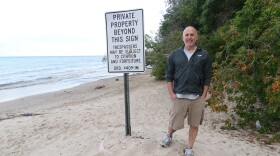Adverse childhood experiences, also known as ACES, are difficult or potentially traumatic experiences that happen before a person turns 18. ACES are based on a Centers for Disease Control and Prevention study conducted in the mid-1990s. And while there’s no perfect definition for what qualifies them, they have been shown to have a negative impact on mental and physical health in adulthood.
Dr. Joshua Mersky and Dr. James “Dimitri” Topitzes are professors of social work at the University of Wisconsin Milwaukee. They spoke about how COVID-19 is affecting child welfare and ACES research. Topitzes says anyone interested in trauma, adversity and ACES should want to understand how this particular point in time may be exacerbating people’s adverse experiences.
“Who knows? As a child growing up in the age of COVID, particularly a young child, is this going to present really unique challenges that could ultimately be counted as a discrete kind of adversity that we’ll want to be able to account for and hopefully address?” asks Topitzes.
Mersky is hopeful that some of the accommodations that have been made due to the pandemic, such as telemental health care, could help children well into the future.
“I would be surprised if we don’t see increased investments, for example, by our National Institutes of Health, in those kinds of technologies," he notes.





